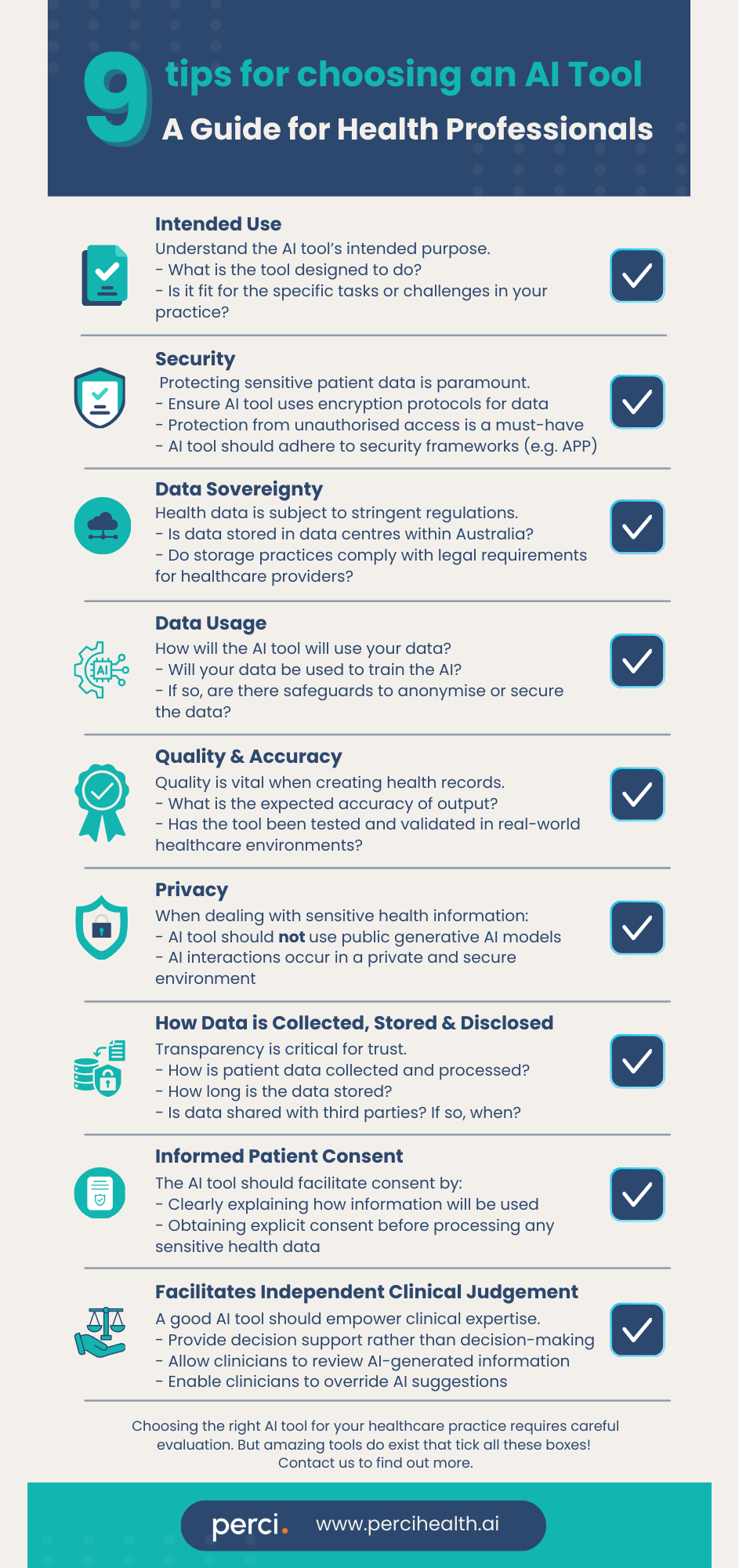October 23, 2024 • 3 min read
9 Tips for Choosing an AI Healthcare Tool

The rise of artificial intelligence (AI) in healthcare presents opportunities to improve efficiency, enhance patient care, and reduce administrative burdens. However, with numerous AI tools available, it’s critical to know what to look for when selecting the right one for your practice. This guide will walk you through essential factors to consider, ensuring that the AI tool you choose is both effective and secure.

1. Intended Use
Before choosing any AI tool, it’s important to understand its intended purpose. Not all AI solutions are designed to meet the specific needs of your practice. Ask yourself:
- What is the tool designed to do?
- Is it fit for the specific tasks or challenges in your practice?
For example, if you need a tool to streamline clinical documentation, ensure that the AI has capabilities tailored for generating detailed and accurate health records.
2. Security
In the healthcare industry, protecting sensitive patient data is paramount. A healthcare AI tool must have robust security measures in place to safeguard against potential cyberattacks. This includes:
- Encryption protocols for data at rest and in transit
- Protection from unauthorised access
- Adherence to security frameworks, such as the Australian Privacy Principles in Australia (or HIPAA in the US).
Always verify that the tool follows industry-standard security practices and regularly updates its defenses against emerging threats.
3. Data Sovereignty
Health data is subject to stringent regulations concerning where and how it can be stored. In Australia, health data must be stored within Australian borders to comply with laws such as the Privacy and Personal Information Protection Act (PPIP) and the Health Records and Information Privacy Act (PRIP). When evaluating AI tools, ensure that:
- The data is stored in data centres within Australia.
- The storage practices comply with local legal requirements for healthcare providers.
4. Data Usage
It’s crucial to understand how the AI tool will use your data. Some AI tools may use the data you input for further training of their models, which can pose privacy risks. You should ask:
- Will your data be used to train the AI?
- If so, are there safeguards to anonymise or secure the data?
For privacy and security, choose tools that do not use sensitive health data for training their models without your explicit consent.
5. Quality and Accuracy
Accuracy is vital when using AI for creating or analysing health records. AI healthcare tools can automate tasks, but how accurate are the results? Inaccurate records could lead to suboptimal patient outcomes or legal issues. Investigate:
- What is the expected accuracy of the AI-generated records?
- Has the tool been tested and validated in real-world healthcare environments?
- Does the tool integrate clinical expertise to enhance the quality of its outputs?
Choosing an AI with a proven track record for accuracy can ensure it enhances rather than hinders your clinical practice.
6. Privacy
Privacy concerns are amplified when dealing with sensitive health information. One red flag to watch for is the use of public generative AI models, which often operate in shared environments, potentially exposing patient data. Always ensure that:
- The AI tool does not use public generative AI models to process or store patient information.
- Any AI interactions occur in a private and secure environment.
For healthcare applications, privacy-protecting AI tools that process data within closed, controlled systems are essential.
7. How Data is Collected, Stored and Disclosed
Transparency in how a health AI tool collects, stores, and shares data is critical for trust. Review the tool’s data handling policies, and ask:
- How is patient data collected and processed?
- How long is the data stored?
- Is data ever shared with third parties, and if so, under what circumstances?
Knowing the answers to these questions ensures that you maintain control over your data and that it is handled responsibly.
8. Informed Patient Consent
Does the AI tool facilitate informed patient consent? In healthcare, patients must be made aware of how their data will be used, stored, and processed. The healthcare AI tool should:
- Clearly explain to patients how their information will be used.
- Obtain explicit consent before processing any sensitive health data.
- Allow patients to opt out of certain data uses.
Facilitating informed consent is not only ethical but also helps protect your practice from legal risks.
9. Facilitates Independent Clinical Judgement
While AI tools can assist healthcare professionals by automating tasks or analysing data, they should never replace a clinician’s independent judgment. Look for tools that:
- Provide decision support rather than decision-making.
- Allow clinicians to review and verify AI-generated information.
- Enable clinicians to override AI suggestions when necessary.
A good healthcare AI tool should empower, not constrain, your clinical expertise, allowing you to make the final call in patient care decisions.
Choosing the right AI tool for your healthcare practice requires careful evaluation of its intended use, security, data handling, and support for clinical independence. By keeping these factors in mind, you can ensure that your chosen AI enhances patient care, meets regulatory standards, and upholds the highest standards of privacy and security.
perci is a healthcare AI tool that summarises phone calls and consultations into accurate clinical notes. Designed specifically for health professionals, perci reduces administrative workload and is safe and secure to use.
Contact us to find out more.
